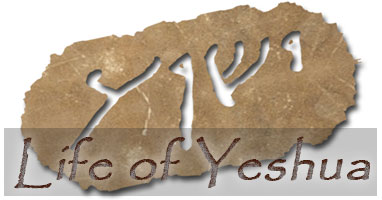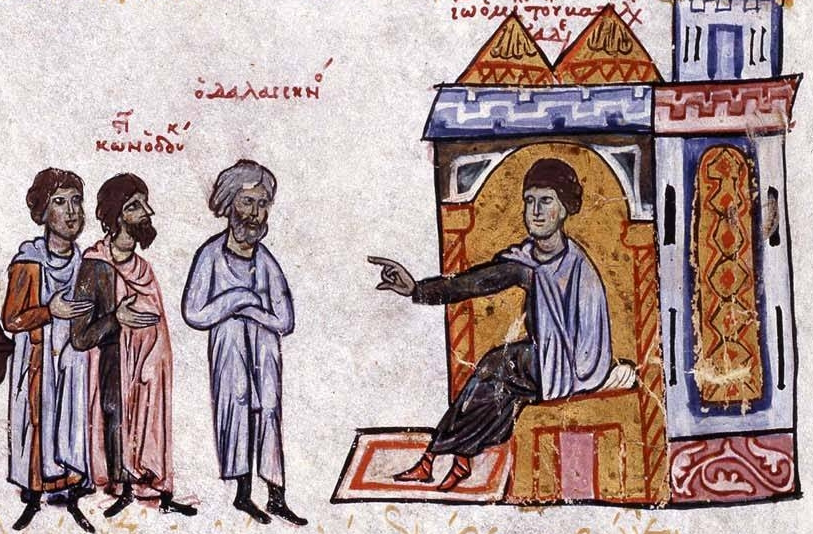Matt. 10:40-42; Mark 9:41; Luke 10:16
(Huck 63, 130b, 139b; Aland 104, 167b, 179; Crook 119-120, 185b, 203)[52]
Revised: 24 November 2021
הַמְּקַבֵּל אֶתְכֶם אוֹתִי מְקַבֵּל וְהַמְּקַבֵּל אוֹתִי מְקַבֵּל אֶת הַשּׁוֹלֵחַ אוֹתִי וְהַמּוֹאֵס אֶתְכֶם אוֹתִי מוֹאֵס וְהַמּוֹאֵס אוֹתִי מוֹאֵס אֶת הַשּׁוֹלֵחַ אוֹתִי
“If anyone receives you, it is as if he has received me, and if anyone receives me, it is as if he has received the one who sent me. But if anyone rejects you, it is as if he has rejected me, and if anyone rejects me, it is as if he has rejected the one who sent me.”[53]
| Table of Contents |
|
3. Conjectured Stages of Transmission 4. Comment 6. Conclusion |
 .
.
.
Reconstruction
To view the reconstructed text of Sending the Twelve: Apostle and Sender click on the link below:
Premium Members and Friends of JP must be signed in to view this content.
If you are not a Premium Member or Friend, please consider registering. Prices start at $5/month if paid annually, with other options for monthly and quarterly and more: Sign Up For Premium
 Click here to return to The Life of Yeshua: A Suggested Reconstruction main page.
_______________________________________________________
Click here to return to The Life of Yeshua: A Suggested Reconstruction main page.
_______________________________________________________
- [1] See Vincent Taylor, “The Original Order of Q,” in New Testament Essays: Studies in Memory of Thomas Walter Manson (ed. A. J. B. Higgins; Manchester: Manchester University Press, 1959), 246-269, esp. 255-256. ↩
- [2] See Bundy, 165, 335; Knox, 2:53; Fitzmyer, 2:856; Davies-Allison, 2:225. ↩
- [3] See David R. Catchpole, “The Mission Charge in Q,” Semeia 55 (1991): 147-174, esp. 166. ↩
- [4] On Jesus as an apostle, see Comment to L140. ↩
- [5] Lindsey described FR as a chronologically arranged epitome of Anth. with improved Greek style. ↩
- [6] See Robert L. Lindsey, “From Luke to Mark to Matthew: A Discussion of the Sources of Markan ‘Pick-ups’ and the Use of a Basic Non-canonical Source by All the Synoptists,” under the subheading “Lukan Doublets: Narrative Doublets.” ↩
- [7] For an argument that John’s version of the Apostle and Sender saying is independent of the Synoptic Gospels, see C. H. Dodd, Historical Tradition in the Fourth Gospel (Cambridge: Cambridge University Press, 1965), 343-347. On the Gospel of John’s relationship to the Synoptic tradition, see also David Flusser, “The Gospel of John’s Jewish-Christian Source,” under the subheading “The Sources of John’s Gospel.” ↩
- [8] See David R. Catchpole, “The Poor on Earth and the Son of Man in Heaven. A Re-Appraisal of Matthew XXV. 31-46,” Bulletin of the John Rylands Library 61 (1979): 355-397, esp. 358. Other scholars who argued in favor of Luke’s ἀκούειν include Streeter, 278; Manson, Sayings 78; Knox, 2:53. ↩
- [9] While it is possible that Justin copied a written source, it is possible that he simply quoted the Apostle and Sender saying from memory. ↩
- [10] See Sending the Twelve: Conduct in Town, Comment to L109. ↩
- [11] See Sending the Twelve: Conduct in Town, L101, L107. ↩
- [12] We have had occasion to observe that FR occasionally preserved the Anthology’s wording better than did the author of Luke when copying Anth. in the Sending the Twelve pericopae. See, for example, Sending the Twelve: Commissioning, Comment to L29; Sending the Twelve: Conduct in Town, Comment to L109. ↩
- [13] See Harnack, 89. ↩
- [14] So Delitzsch, Luke 10:16. ↩
- [15] For Justin’s version of the Apostle and Sender saying, see above, Comment to L137. ↩
- [16] On the equivalence of the terms ἀπόστολος and שָׁלִיחַ, see Choosing the Twelve, Comment to L10-11. ↩
- [17] See Walter Grundmann, “δέχομαι,” TDNT, 2:53; Davies-Allison, 2:226; Fitzmyer, 2:857; Tomson, If This Be, 133; France, Matt., 413. N.B.: In Nazi Germany Walter Grundmann served as director of the Institut zur Erforschung und Beseitigung des jüdischen Einflusses auf das deutsche kirchliche Leben (Institute for the Study and Eradication of Jewish Influence on German Church Life). Consequently, Grundmann’s scholarship should be approached with due caution as his judgments were colored by his anti-Semitic worldview. On Grundmann, see Susannah Heschel, “Nazifying Christian Theology: Walter Grundmann and the Institute for the Study and Eradication of Jewish Influence on German Church Life,” Church History 63.4 (1994): 587-605. ↩
- [18] In rabbinic sources שָׁלִיחַ and שָׁלוּחַ are synonymous and interchangeable. ↩
- [19] It is unlikely that the shāliaḥ institution would have been a completely foreign concept to non-Jewish Greek readers. The principle that a servant should be treated with the dignity due to his master appears to have been widespread. See, for example, Ignatius’ exhortation to the Ephesians:
πάντα γὰρ ὃν πέμπει ὁ οἰκοδεσπότης εἰς ἰδίαν οἰκονομίαν, οὕτως δεῖ ἡμᾶς αὐτὸν δέχεσθαι, ὡς αὐτὸν τὸν πέμψαντα
For everyone whom the master of the house sends to do his business ought we to receive as him who sent him. (Ign. Eph. 6:1; Loeb)
- [20] Whenever Jesus spoke of himself as being “sent” (e.g., Luke 4:18) or referred to “the one who sent me” (Matt. 10:40; Luke 10:16; John 20:21), the natural inference was that Jesus regarded himself as God’s shāliaḥ (“apostle,” “emissary”). Although there is no record in the Gospels of Jesus explicitly claiming “I am God’s apostle,” Jesus is referred to as an apostle in Heb. 3:1. In other NT passages, the assumption that Jesus was an apostle is implicit. Cf., e.g., Eph. 2:20 in which the apostles are foundation stones and Jesus is the chief cornerstone. Jesus and the (other) apostles are classed as the same type of object: stones. Justin Martyr was emphatic that Jesus was God’s apostle (1 Apol. 63:5, 10, 14). ↩
- [21] Scenarios in which one apostle or emissary appoints another apostle or emissary in his place are contemplated in Sifre Num. Zuta, on Num. 14:34 (ed. Horovitz, 279). ↩
- [22] Manson (Sayings, 78) suggested that “It is possible that the original form of the saying was fuller than any of the three existing versions. Perhaps it ran:
He that heareth you heareth me;
[And he that heareth me heareth him that sent me:]
And he that rejecteth you rejecteth me;
And he that rejecteth me rejecteth him that sent me.” ↩ - [23] Catchpole, noting that ἀθετεῖν is not typical of Lukan reaction, since this verb never occurs in Acts and only twice in his Gospel (Luke 7:30; 10:16), concluded that Luke 10:16 probably reflects the wording of the pre-synoptic source known to the authors of Matthew and Luke. See David R. Catchpole, “On Doing Violence to the Kingdom,” Journal of Theology for Southern Africa 25 (1978): 50-61, esp. 55. ↩
- [24] Delitzsch translated ἀθετεῖν with בָּזָה in Luke 10:16. ↩
- [25] From a hand-written note in the margins of his copy of Morton Smith’s Tannaitic Parallels to the Gospels, 80, we find that Lindsey contemplated using מָאַס to reconstruct Luke 10:16. ↩
- [26] Other examples where מָאַס is used with the direct object marker אֶת rather than the preposition -בְּ include Num. 11:20; 1 Sam. 10:19; 15:23, 26; 2 Kgs. 17:15; 23:27; Isa. 5:24; 8:6; Jer. 14:19; Ezek. 20:13; Amos 2:4. ↩
- [27] Knox, 2:53. ↩
- [28] See Sending the Twelve: Commissioning, under the subheading “Conjectured Stages of Transmission,” and Comment to L1-7. ↩
- [29] Hill has suggested that “righteous person” was a title borne by leaders in the Matthean community. See David Hill, “ΔΙΚΑΙΟΙ as a Quasi-Technical Term,” New Testament Studies 11.3 (1965): 296-302. ↩
- [30] On the cessation of prophecy, see Widow’s Son in Nain, Comment to L22. ↩
- [31] See Catchpole, “Poor on Earth,” 360. ↩
- [32] See Gundry, Matt., 202. ↩
- [33] See Luz, 2:119; Nolland, Matt., 444. ↩
- [34] See Catchpole, “Poor on Earth,” 359; Gundry, Matt., 202. Aside from Matt. 10:41, the εἰς ὄνομα formula occurs in Matt. 10:42, where Matthew’s source had ἐν ὀνόματι (Mark 9:41); Matt. 18:20, in a pericope where the author of Matthew twice mentions the Church (Matt. 18:17); and Matt. 28:19, in which the author of Matthew includes a trinitarian baptismal formula. ↩
- [35] See Moulton-Milligan, 451. ↩
- [36] In Matthew μισθός refers to a reward from God in Matt. 5:12, 46; 6:1, 2, 5, 16; 10:41 (2xx), 42. Mark uses μισθός in the sense of reward from God only in Mark 9:41 (∥ Matt. 10:42). Luke uses μισθός in the sense of reward from God in Luke 6:23 (∥ Matt. 5:12) and Luke 6:35 (∥ Matt. 5:46). ↩
- [37] See Streeter, 263; Catchpole, “Poor on Earth,” 359-360. ↩
- [38] See Robert L. Lindsey, “‘Verily’ or ‘Amen’—What Did Jesus Say?” ↩
- [39] See Hans Bietenhard, “ὄνομα,” TDNT, 5:258-261; Hans Kosmala, “In My Name,” Annual of the Swedish Theological Institute 5 (1966/67): 87-109, esp. 91-93. ↩
- [40] See Swete, 208; Moulton-Milligan, 451. ↩
- [41] See Nolland, Matt., 445. ↩
- [42] See Gundry, Matt., 203. ↩
- [43] See Streeter, 263-264. ↩
- [44] See Lost Sheep and Lost Coin, Comment to L2. ↩
- [45] Hawkins, 152 n. 2. ↩
- [46] See Gill, 7:115. In the Mishnah we find the following statement:
הָיָה מְסָרֵב בַּחֲבֵירוֹ שֶׁיֹּאכַל אֶצְלוֹ אָמַ′ קוּנַּם לְבֵיתָךָ שֶׁאֵנִי נִכְנַס טִיפַּת צוֹנִין שֶׁאֵנִי טוֹעֵם לָךְ מוּתָּר לִיכָּנֵס לְבֵיתוֹ וְלִשְׁתּוֹת מִמֶּנּוּ צוֹנִין שֶׁלֹּא נִתְכַּוַּון זֶה אֶלָּא לְּשֵׁם אֲכִילָה וּשְׁתִייָּה
If someone urged his friend to eat with him and his friend said, “Konam if I enter your house!” or “...if I taste a drop of cold [water] [טִיפַּת צוֹנִין]!” it is permitted for him to enter his house and to drink cold [water] [צוֹנִין] since he did not intend his vow except for the purpose of eating and drinking [one particular meal]. (m. Ned. 8:7)
- [47] See Luz, 2:122 n. 31. ↩
- [48] See Gundry, Matt., 202. ↩
- [49] See Hawkins, 152 n. 2. ↩
- [50]
Sending the Twelve: Apostle and Sender Luke’s Version Anthology’s Wording (Reconstructed) ὁ ἀκούων ὑμῶν ἐμοῦ ἀκούει καὶ ὁ ἀθετῶν ὑμᾶς ἐμὲ ἀθετεῖ ὁ δὲ ἐμὲ ἀθετῶν ἀθετεῖ τὸν ἀποστείλαντά με ὁ δεχόμενος ὑμᾶς ἐμὲ δέχεται καὶ ὁ ἐμὲ δεχόμενος δέχεται τὸν ἀποστείλαντά με καὶ ὁ ἀθετῶν ὑμᾶς ἐμὲ ἀθετεῖ καὶ ὁ ἐμὲ ἀθετῶν ἀθετεῖ τὸν ἀποστείλαντά με Total Words: 19 Total Words: 27 Total Words Identical to Anth.: 13 Total Words Taken Over in Luke: 13 Percentage Identical to Anth.: 68.42% Percentage of Anth. Represented in Luke: 48.15% ↩
- [51]
Sending the Twelve: Apostle and Sender Matthew’s Version Anthology’s Wording (Reconstructed) ὁ δεχόμενος ὑμᾶς ἐμὲ δέχεται καὶ ὁ ἐμὲ δεχόμενος δέχεται τὸν ἀποστείλαντά με ὁ δεχόμενος ὑμᾶς ἐμὲ δέχεται καὶ ὁ ἐμὲ δεχόμενος δέχεται τὸν ἀποστείλαντά με καὶ ὁ ἀθετῶν ὑμᾶς ἐμὲ ἀθετεῖ καὶ ὁ ἐμὲ ἀθετῶν ἀθετεῖ τὸν ἀποστείλαντά με Total Words: 13 Total Words: 27 Total Words Identical to Anth.: 13 Total Words Taken Over in Matt: 13 Percentage Identical to Anth.: 100.00% Percentage of Anth. Represented in Matt.: 48.15% ↩
- [52] For abbreviations and bibliographical references, see “Introduction to ‘The Life of Yeshua: A Suggested Reconstruction.’” ↩
- [53] This translation is a dynamic rendition of our reconstruction of the conjectured Hebrew source that stands behind the Greek of the Synoptic Gospels. It is not a translation of the Greek text of a canonical source. ↩




